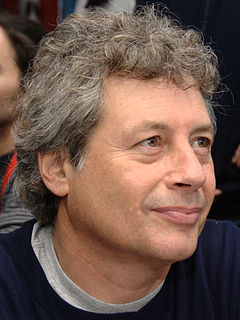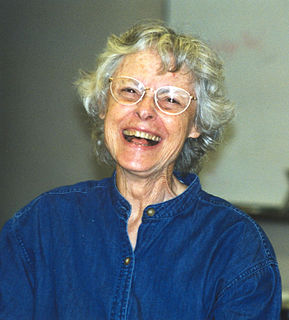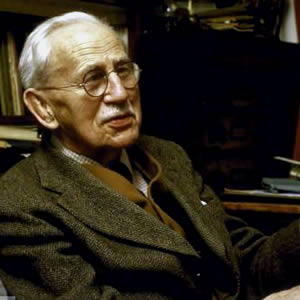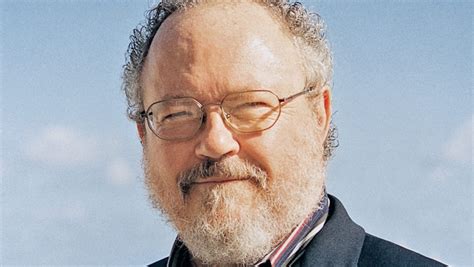A Quote by Rhys Darby
I find Godzilla exciting because he/she/it comes from the sea. It's entirely plausible that it could be real. Yes it is! It doesn't take a huge stretch in the imagination to imagine that something may be living at the deepest depths of one of our oceans.
Related Quotes
But in a way you can say that after leaving the sea, after all those millions of years of living inside of the sea, we took the ocean with us. When a woman makes a baby, she gives it water, inside her body, to grow in. That water inside her body is almost exactly the same as the water of the sea. It is salty, by just the same amount. She makes a little ocean, in her body. And not only this. Our blood and our sweating, they are both salty, almost exactly like the water from the sea is salty. We carry oceans inside of us, in our blood and our sweat. And we are crying the oceans, in our tears.
Say the sea. Say the sea. Say the sea. So that perhaps a drop of that magic may wander through time, and something might find it, and save it before it disappears forever. Say the sea. Because it's what we have left. Because faced by the sea, we without crosses, without magic, we must still have a weapon, something, so as not to die in silence, that's all.
Much of the attention on oceans has portrayed oceans as a villain. Warm water strengthened Hurricane Katrina that pounded Louisiana. Rising sea level will flood islands and coastal areas. Or, we're talking about new opportunities like a new shipping lane in the Arctic because of melting sea ice. These may be the obvious problems, but they're probably not the biggest ones.
It is sufficiently humiliating to our nature to reflect that our knowledge is but as she rivulet, our ignorance as the sea. On points of the highest interest, the moment we quit the light of revelation we shall find that Platonism itself is intimately connected with Pyrrhonism, and the deepest inquiry with the darkest doubt.
We are living in a very exciting and powerful time. On the deepest level of consciousness, a radical spiritual transformation is taking place. I believe that on a worldwide level, we are being challenged to let go of our present way of life and create an entirely new one. We are, in fact, in the process of destroying our old world and building a new one in its place.
Finally, it is important to make it clear that imagination is not an exercise for those detached from reality, those who live in the air. On the contrary, when we imagine something, we do it necessarily conditioned by a lack in our concrete reality. When children imagine free and happy schools, it is because their real schools deny them freedom and happiness.
The living ocean drives planetary chemistry, governs climate and weather, and otherwise provides the cornerstone of the life-support system for all creatures on our planet, from deep-sea starfish to desert sagebrush. That's why the ocean matters. If the sea is sick, we'll feel it. If it dies, we die. Our future and the state of the oceans are one.
When we meditate, what we actually do is enter into a vacant, calm, still, silent mind. We go deep within and approach our true existence, which is our soul. When we live in the soul, we feel that we are actually meditating spontaneously. On the surface of the sea are multitudes of waves, but the sea is not affected below. In the deepest depths, at the bottom of the sea is all tranquility. So when you start meditating, try to feel your own inner existence first. That is to say, the bottom of the sea: calm and quiet. Feel that your whole being is surcharged with peace and tranquility.
Our lives aren't even about doing real things most of the time. We think and talk about people we've never met, pretend to visit places we've never actually been to, discuss things that are just names as though they were as real as rocks or animals or something. Information Age - Hell it's the Imagination Age. We're living in our own minds. No, she decided as the plane began its steep descent, really we're living in other people's minds.
There is the life of the plankton in almost endless variety; there are the many kinds of fish, both surface and bottom living; there are the hosts of different invertebrate creatures on the sea-floor; and there are those almost grotesque forms of pelagic life in the oceans depths. Then there are the squids and cuttlefish, and the porpoises, dolphins and great whales.
Now she realized that she was not peering at a so-dark-blue-it-looked-black ocean, but rather she was looking straight through miles of incredibly clear water at something enormous and black in its nethermost depths. Maybe it was the bottom - so deep that not even light could touch it. And yet, down in those impossible depths, she thought she could see tiny lights sparkling. She stared uncertainly at the tiny glimmerings. They seemed almost like scattered grains of sand lit from within; in some places they clustered like colonies, faint and twinkling. Like stars.


































